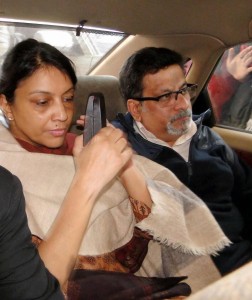After five years of legal wrangling and public conjecture, a wealthy Delhi couple have been jailed for life for murdering their teenage daughter and a male servant in a case beset by police bungling and trial by media.
Dentists Rajesh and Nupur Talwar are said to have killed 14 year-old Aarushi and Nepalese house servant Hemraj Banjade, 45, after discovering them in an “objectionable” situation in 2008. Aarushi was found in bed with her throat cut with, according to the prosecution, “clinical precision”. After initially being regarded as the prime suspect, the missing Benjade was later found dead on the roof of the house. He had a similar injury to that which killed Aarushi and he also had blunt object wounds to the head.
Police attention then turned to Mr and Mrs Talwar, who were believed to have murdered the pair as an ‘honour killing’ despite the absence of solid evidence. A theory that another party or parties had attacked Aarushi and killed Benjade after he came to her aid was rejected by the prosecution after three suspects passed lie detector tests.
The case has maintained a high profile in India because of what has been termed police incompetence as well as the relative affluence of the perpetrators. The police failed to seal off the crime scene, leaving potentially crucial forensic evidence to be disturbed by journalists, curious onlookers and the Talwars themselves, who were not arrested until a week later. There was also a 24 hour gap between the discovery of Aarushi’s body and that of Benjade, which was just metres away.
The prosecution based its entire case on the so-called ‘last-seen theory’ – that the victims were last seen with the accused – and the notion that the Talwars probably came home to find Aarushi and the servant in an uncompromising position. The term “clinical precision” used by the prosecution of the victims’ wounds also pointed the finger of suspicion towards an assailant with surgical training. The dearth of substantial evidence even moved the prosecution to attempt to close the case in December 2010. A judge rejected this application, ordering the Talwars to stand trial.
In sentencing on Tuesday (November 26) Judge Shyam Lal stopped short of the available death sentence in favour of life imprisonment for both defendants. Defence lawyer Satyaketu Singh said after sentencing that “there is no evidence against them” and expressed confidence that “this judgment will be overturned.”









